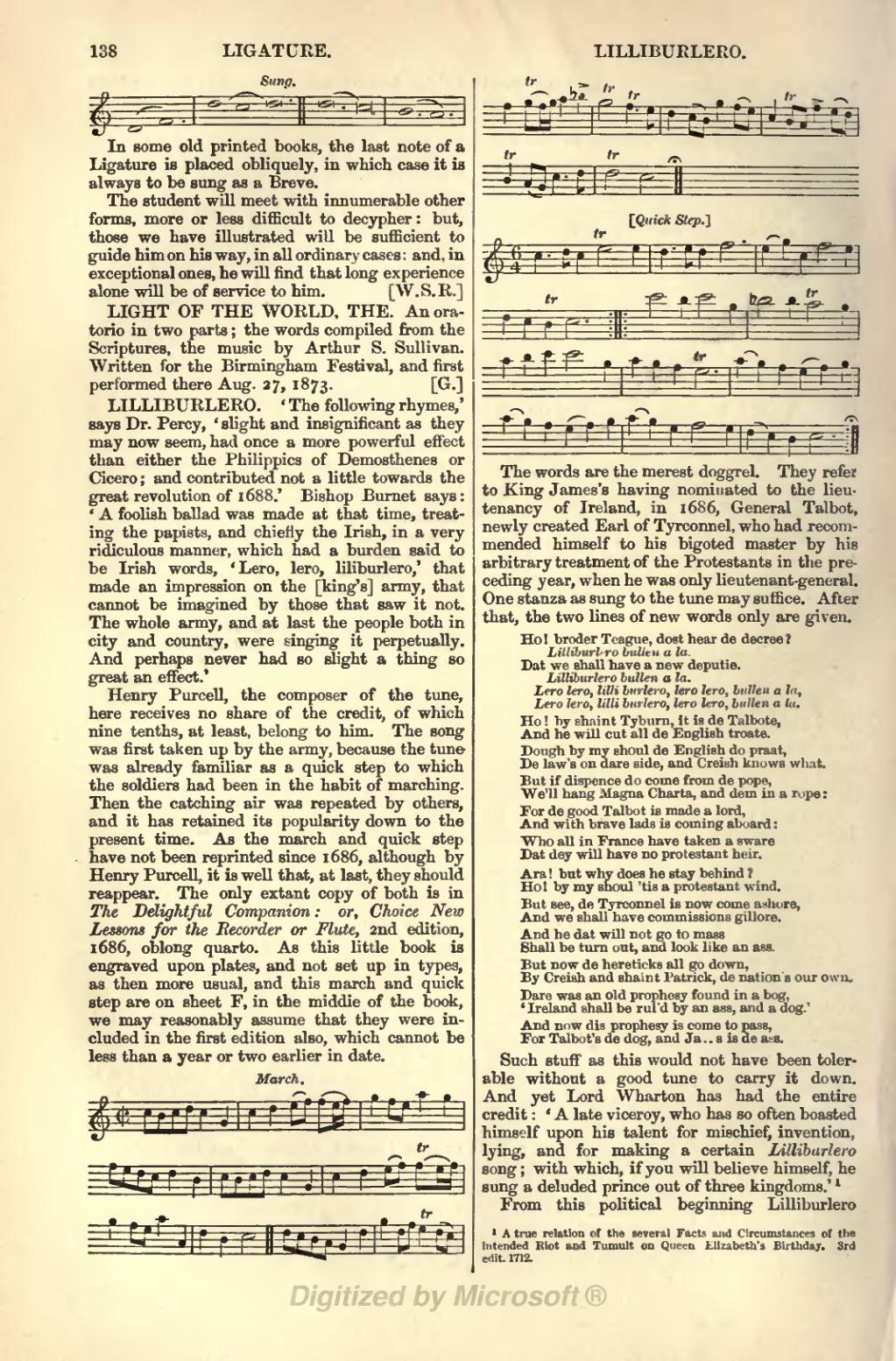In some old printed books, the last note of a Ligature is placed obliquely, in which case it is always to be sung as a Breve.
The student will meet with innumerable other forms, more or less difficult to decypher: but, those we have illustrated will be sufficient to guide him on his way, in all ordinary cases; and, in exceptional ones, he will find that long experience alone will be of service to him.
[ W. S. R. ]
LIGHT OF THE WORLD, THE. An oratorio in two parts; the words compiled from the Scriptures, the music by Arthur S. Sullivan. Written for the Birmingham Festival, and first performed there Aug. 27, 1873.
[ G. ]
LILLIBURLERO. 'The following rhymes,' says Dr. Percy, 'slight and insignificant as they may now seem, had once a more powerful effect than either the Philippics of Demosthenes or Cicero; and contributed not a little towards the great revolution of 1688.' Bishop Burnet says: 'A foolish ballad was made at that time, treating the papists, and chiefly the Irish, in a very ridiculous manner, which had a burden said to be Irish words, 'Lero, lero, liliburlero,' that made an impression on the [king's] army, that cannot be imagined by those that saw it not. The whole army, and at last the people both in city and country, were singing it perpetually. And perhaps never had so slight a thing so great an effect.'
Henry Purcell, the composer of the tune, here receives no share of the credit, of which nine tenths, at least, belong to him. The song was first taken up by the army, because the tune was already familiar as a quick step to which the soldiers had been in the habit of marching. Then the catching air was repeated by others, and it has retained its popularity down to the present time. As the march and quick step have not been reprinted since 1686, although by Henry Purcell, it is well that, at last, they should reappear. The only extant copy of both is in The Delightful Companion: or, Choice New Lessons for the Recorder or Flute, 2nd edition, 1686, oblong quarto. As this little book is engraved upon plates, and not set up in types, as then more usual, and this march and quick step are on sheet F, in the middle of the book, we may reasonably assume that they were included in the first edition also, which cannot be less than a year or two earlier in date.
March.

[Quick Step.]

The words are the merest doggrel. They refer to King James's having nominated to the lieutenancy of Ireland, in 1686, General Talbot, newly created Earl of Tyrconnel, who had recommended himself to his bigoted master by his arbitrary treatment of the Protestants in the preceding year, when he was only lieutenant-general. One stanza as sung to the tune may suffice. After that, the two lines of new words only are given.
Ho! broder Teague, dost hear de decree?
Lilliburlero bullen a la.
Dat we shall have a new deputie.
Lilliburlero bullen a la.
Lero lero, lilli burlero, lero lero, bullen a la,
Lero lero, lilli burlero, lero lero, bullen a la.
Ho! by shaint Tyburn, it is de Talbote,
And he will cut all de English troate.
Dough by my shoul de English do praat,
De law's on dare side, and Creish knows what.
But if dispence do come from de pope,
We'll hang Magna Charta, and dem in a rope:
For de good Talbot is made a lord,
And with brave lads is coming aboard:
Who all in France have taken a sware
Dat dey will have no protestant heir.
Ara! but why does he stay behind?
Ho! by my shoul 'tis a protestant wind.
But see, de Tyrconnel is now come ashore,
And we shall have commissions gillore.
And he dat will not go to mass
Shall be turn out, and look like an ass.
But now de hereticks all go down,
By Creish and shaint Patrick, de nation's our own.
Dare was an old prophesy found in a bog,
'Ireland shall be rul'd by an ass, and a dog.'
And now dis prophesy is come to pass,
For Talbot's de dog, and Ja..s is de ass.
Such stuff as this would not have been tolerable without a good tune to carry it down. And yet Lord Wharton has had the entire credit: 'A late viceroy, who has so often boasted himself upon his talent for mischief, invention, lying, and for making a certain Lilliburlero song; with which, if you will believe himself, he sung a deluded prince out of three kingdoms.'[1]
From this political beginning Lilliburlero
- ↑ A true relation of the several Facts and Circumstances of the intended Riot and Tumult on Queen Elizabeth's Birthday. 3rd edit. 1712.
